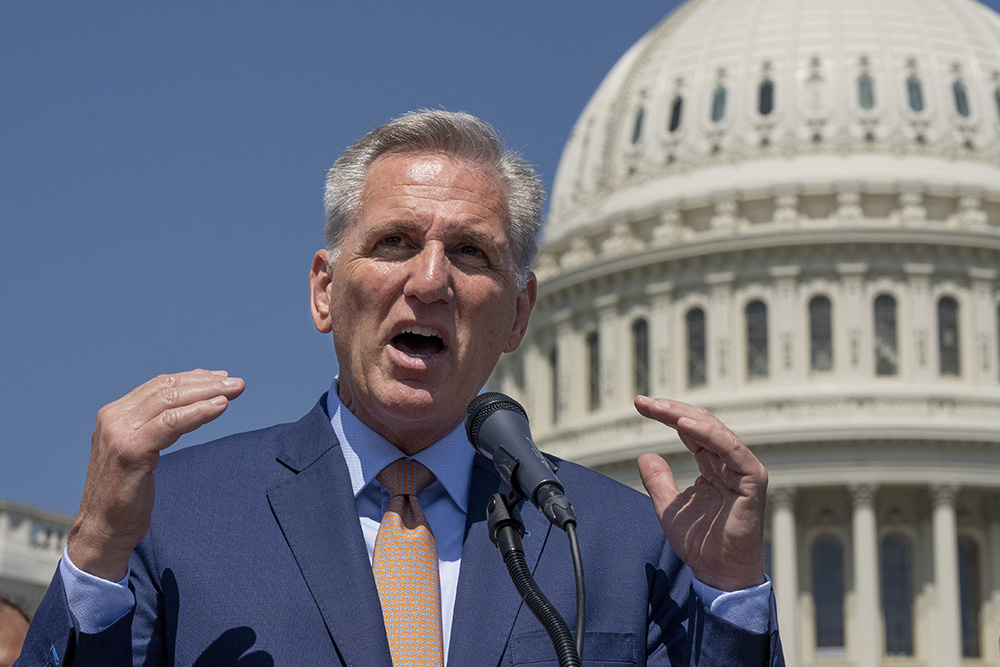
Speaker of the House Kevin McCarthy, R-California, speaks at the Capitol in Washington April 20. (AP/J. Scott Applewhite, File)
Congress and the White House have until the end of the month to raise the debt ceiling, which means that the rest of May will be consumed with a high stakes game of chicken. At a time when our politics is a toxic mix of outrage, ideology and braggadocio worthy of Mussolini, this fight will test whether our nation is up to the task of self-governance.
Unlike most policy battles, a fight over the debt ceiling vote dominates everything else. At 6 p.m. on Tuesday night, on the Politico homepage, the first six articles all focused on the debt ceiling fight. "Biden starts to throw some punches in the debt ceiling fight" was in the hero position, followed by "Former Biden adviser Tribe: Just use the 14th Amendment now," "Raskin: Biden has a 'constitutional command' on debt," "Podesta: Cut energy permitting talks from debt ceiling fight," "Debt ceiling brawl jams up the Pentagon's mega policy bill" and "Debt anxiety falls a little on the Hill. It might not be enough."
As is common in our political life, both sides articulate principled positions. President Joe Biden is not wrong to argue that the debt ceiling is so important, it deserves a vote untethered to other policy considerations, a "clean vote." House Speaker Kevin McCarthy is correct when he says that the nation must come to terms with its ballooning debt.
The problem with Biden's position is that you can never really disassociate any policy from politics and the problem with the McCarthy position is that his own party is largely responsible for the nation's debt because of its addiction to tax cuts. In short, the principled positions are not really on point for the issue at hand.
No one knows what would happen if the U.S. government were to default on its debt. The Bipartisan Policy Center states: "Failure to extend the debt limit in a timely manner would likely have catastrophic consequences for global financial markets and Americans across the country." The center has a useful history of recent debt ceiling fights.
What we know from history is that when an economic crisis occurs, the poor and the marginalized are the first to suffer and the worst to recover. For all the problems with inflation today, and those problems are real, the fact that our economy attained a record low unemployment rate for Black Americans this spring is an enormous accomplishment. That achievement would be imperiled by any kind of economic downturn.
Advertisement
The history lesson is useful, but with a caveat. Political games of chicken in advance of a debt ceiling cliff have happened before, but they have never happened at a time when a speaker of the House relies on the votes of his caucus, many of whom are drunk on the Trumpian belief that blowing things up is a good thing.
Whether it was our NATO alliance or respecting the results of an election or the Iran nuclear deal, former President Donald Trump has shown again and again that there is a lane, perhaps a winning lane, for a politician who builds on the distrust of institutions that is engrained in the contemporary American psyche to advocate not just throwing the bums out but torching the house too.
Wednesday night, on CNN, Trump was asked about the debt ceiling.
"I say to the Republicans out there — congressmen, senators — if they don't give you massive cuts, you're going to have to do a default. And I don't believe they're going to do a default because I think the Democrats will absolutely cave because you don't want to have that happen. But it's better than what we're doing right now because we're spending money like drunken sailors."
Trump's time out of office has not taught him the value of prudence or caution. It is all about winning or losing the political game. Politics is not a game.
At the Brookings Institution, Sarah Binder argues that recourse to a discharge petition is not a likely option. That is a shame. A discharge petition allows a majority of the House to force a vote on a proposal that is bottled up in committee. The hope would be that the Democrats could peel off the five Republicans they would need to pass a clean debt ceiling bill.
Binder points out that "lawmakers have successfully discharged less than four percent of the 639 discharge petitions introduced since 1935." Apparently, there are not five GOP House members willing to do the right thing.
There are ways to put the government on a more sustainable financial path, but that would involve steps that one or the other party finds anathema. Democrats rightly refuse to cut social programs. Republicans refuse to raise taxes. Neither party is willing to confront the bloated defense budget.
The Democrats need to do a better job looking for ways to bring spending down and Republicans need to get over their anti-tax orthodoxy, and then the outlines of a compromise would emerge. With highly gerrymandered districts, however, the only political pressure most members of Congress face is from their flank, not from the center.
The looming fiscal and economic crisis is, therefore, best understood as one more eruption in our political crisis. Neither party is blameless, but there is no moral equivalence in this comparison. Today's Republican Party depends on people who are fundamentally irresponsible.
As evidenced by the reaction to Trump from the GOP voters in Wednesday night's town hall, they root for their guy even when he is obviously lying. It is politics as professional wrestling. It isn't pretty. It might be about to send the world economy over a cliff.







